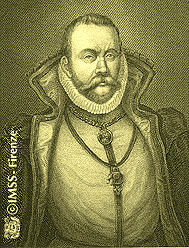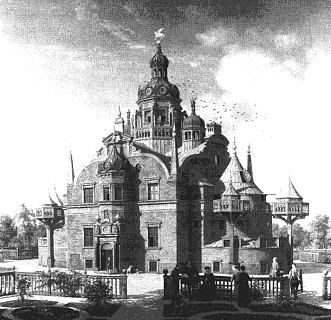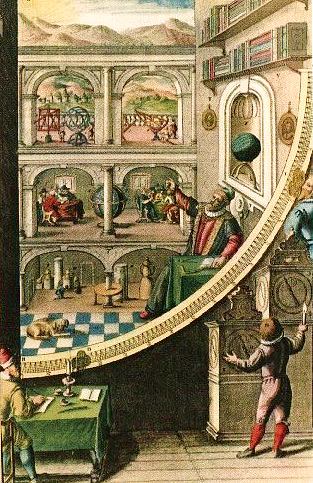
Tycho Brahe (1546 - 1601)
Tycho Brahe (usually known by his first name only, a Latinized version of the Danish, Tyge) was the eldest son of a noble Danish family, and as such appeared destined for the natural aristocratic occupations of hunting and warfare. However, Tycho's uncle Joergen, who was an educated country squire and vice-admiral, had no children. Tycho's father had agreed with Joergen before Tycho was born that if Tycho was a boy, then Joergen could adopt and raise him -- but then Tycho's father changed his mind and reneged. When Tycho's younger brother was born, Joergen decided that one boy each was good enough, and he kidnapped Tycho. Tycho's father threatened to murder Joergen, but eventually calmed down, since Tycho stood to inherit a large estate from his uncle.When Tycho was seven, Joergen insisted that he begin studying Latin. His parents objected, but Joergen said this would help Tycho become a lawyer. At age thirteen, Tycho went to Copenhagen to study law and philosophy. At this impressionable age, an event took place that changed Tycho's life. There was a partial eclipse of the Sun. This had been predicted, and took place on schedule. It struck Tycho as "something divine that men should know the motions of the stars so accurately that they were able a long time beforehand to predict their places and relative positions". Perhaps this predictability was especially appealing to one whose personal life was evolving in rather an uncertain way. One of the advantages of being a rich kid was that he could immediately go out and buy a copy of Ptolemy's Almagest (in Latin), and some sets of astronomical tables, which showed the positions of the planets at any given time. Ptolemy himself had made such tables, and they had been revised in Spain by a group of fifty astronomers in 1252, brought together by Alfonso X of Castile. These were called the Alfonsine tables. Tycho also bought a recent set of tables based on Copernicus' theory.
At age sixteen, Joergen sent Tycho to Leipzig, in Germany, to continue his study of law. He was accompanied by a tutor, the twenty-year-old Anders Vedel, who himself later became famous as Denmark's first great historian. However, Tycho was obsessed with astronomy. He bought books and instruments, which he hid from his tutor, and stayed up much of each night observing the stars. When he was seventeen, he observed a special event -- Jupiter and Saturn passed very close to each other. (This was on August 17, 1563.) He found upon checking the tables that the Alfonsine tables were off by a month in predicting this event, and the Copernican tables off by several days. Tycho decided this was a pathetic performance by the astronomers, and that much better tables could be constructed just by more accurate observation of the exact positions of the planets over an extended period of time. He decided that this was what he was going to do. Vedel realized Tycho was a hopeless case, and gave up trying to tutor him in law. The two remained good friends for life. Meanwhile, Tycho's uncle Joergen had died of pneumonia after rescuing the king of Denmark from drowning after the king had fallen off the bridge to his castle into the moat. When Tycho returned to Denmark, most of his family was hostile to him. They were disdainful of his stargazing, and criticised him for neglecting the law. He decided to return to Germany, and soon was keeping company with some rich amateur astronomers in Augsburg. He persuaded them that what was needed was accurate observation, and (as telescopes had not yet been invented) this meant rather large quadrants to get lines of sight on stars. They set up a large wooden quadrant, part of a circle with a nineteen foot radius, that took twenty men to build. It was graduated in sixtieths of a degree. This was the beginning of Tycho's accurate observations.
One incident during his stay in Germany suggests that Tycho inherited a hot nature from his father as well as his title. Tycho lost his temper in a quarrel with another student over who was the better mathematician, and this led to a duel in which part of Tycho's nose was cut off. The lost piece was replaced by a gold and silver one, which Tycho always carried around with him in a snuffbox containing some "ointment or glutinous composition" that he frequently rubbed on his nose, to keep it stuck on. Reputedly, Tycho was rather proud of his gold nose.
At the age of twenty-six, in 1570, Tycho returned to Denmark. He lived for a while with his family, then with an uncle, Steen Bille, who had founded the first paper mill and glassworks in Denmark. He was the only family member who approved of star gazing. In 1572, another astronomical event took place that changed Tycho's life. On November 11, walking back from Steen's alchemy lab, Tycho noticed a new star in the sky that was brighter than Venus. He did not believe his eyes. He called some servants, then some peasants, to reassure him that it was really there. The new star was so bright that it could be seen in daylight. It lasted eighteen months. It was what is now called a nova, a rare event. These are not new stars, but existing ones that explode and increase enormously in brightness. Prior to the explosion they may be too faint to be seen with the naked eye. Before the days of the telescope, they did indeed seem to be new stars.
The crucial question from the astronomical and theological point of view was, where exactly was this new star? Was it an event in the upper atmosphere, that is to say, below the Moon? If so, that would be OK, because this region, below the Moon, was where change and decay took place according to Aristotle. On the other hand, if it was out there in the eighth sphere, the fixed stars, on the edge of Heaven, that contradicted both Aristotelian and Christian dogma, because that sphere was thought to be unchanged since the Day of Creation and was jolly well supposed to stay that way. Maestlin in Tubingen, and Thomas Diggs in England, leading astronomers, tried to detect movement in the new star by lining it up with known fixed stars, using stretched threads. They could see no movement. Tycho had just finished building a new sextant, with arms five and a half feet long, a massive bronze hinge, a metallic scale calibrated in minutes (sixtieths of a degree) and a table of corrections for the remaining tiny errors in the instrument. His technology was far ahead of the competition, and he was able to settle the argument. The new star did not move at all relative to the fixed stars. It was far beyond the Moon. Tycho published a detailed account of his methods and findings the next year. He hesitated some time before publishing, because book writing seemed a bit undignified for a nobleman. Similarly, when some of the other young nobles asked him to give a course on astronomy, he refused, and only changed his mind when the King told him to do it.
By 1575, Tycho was famous throughout Europe, and he embarked on a grand tour, visiting astronomers in many cities. He decided it would be nice to move down to Basle, in Switzerland, a charming and civilized town. King Frederick II of Denmark (the same king whose life had been saved by Tycho's uncle) was very upset at the thought of losing his best astronomer (and astrologer). After offering Tycho various castles, which didn't prove persuasive, he offered him a whole island, flat with white cliffs, about three miles long, called Hveen, near Hamlet's castle of Elsinore. Denmark would bankroll the building of an observatory and house, and the inhabitants of the island, who worked forty farms grouped around a small village, would become Tycho's subjects. (The reason why the king of a small country had so much wealth at his disposal was that the Protestant Reformation had placed the Church's lands and resources in his hands.)
 |
The quadrant was centered on an open window through which the observations were made. Several clocks were used simultaneously to time the observations as precisely as possible -- an observer and a timekeeper worked together. Tycho's large staff and several sets of equipment permitted four independent measurements of the same thing simultaneously, greatly reducing the possibility of error. The precision of astronomical measurement, which had held at ten minutes of arc since Ptolemy, was reduced at Uraniborg to one minute of arc. The observatory was full of gadgets -- there were statues turned by hidden mechanisms, and Tycho had a system of bells that he could ring in any room to summon assistants. In 1577 a great comet appeared in the sky and Tycho observed it carefully. It was the first dispassionate study of a comet; the first to be watched without panic at the supposed catastrophes it foretold. Parallax studies showed that this object was farther away than the moon -- an even worse blow against the perfection of the heavens than the new star. Aristotle had recognized that the erratic comings and goings of comets could not be harmonized with the permanence and regularity of motion of other bodies, and therefore had insisted that comets were atmospheric phenomena. He was wrong.
Tycho, in studying the apparent motion of the comet, reluctantly came to the conclusion that its orbit could not be circular but must be rather elongated. This was a daring suggestion because in that case it had to be passing through the various planetary spheres, and it could scarcely do that unless the planetary spheres did not exist. Such a possibility went much against Tycho's personal leanings, for he was a conservative astronomer who would not abandon the notion of Ptolemy that the Earth was the center of the Universe. Tycho was the last great astronomer to insist on this and to reject the heliocentric theory of Copernicus.
 Tycho's great argument against Copernicus was the lack of stellar parallax, and he used this argument in his correspondence with
Galileo in an attempt to lure the latter away from Copernicanism. In this he failed. In his book on the comet, published in 1583, Tycho tried to strike a compromise. He was willing to go so far as to suggest that all the planets, except the Earth, revolved about the Sun. Then, he held that the Sun with its train of attendant planets revolved about the Earth. This "Tychonic theory" was proposed, in part, to emphasize Tycho's orthodoxy as a shield against his enemies at the Danish
Tycho's great argument against Copernicus was the lack of stellar parallax, and he used this argument in his correspondence with
Galileo in an attempt to lure the latter away from Copernicanism. In this he failed. In his book on the comet, published in 1583, Tycho tried to strike a compromise. He was willing to go so far as to suggest that all the planets, except the Earth, revolved about the Sun. Then, he held that the Sun with its train of attendant planets revolved about the Earth. This "Tychonic theory" was proposed, in part, to emphasize Tycho's orthodoxy as a shield against his enemies at the Danish However, a half century later, when Riccioli was giving names to the craters on the moon which the telescope had revealed, Tycho was remembered. Riccioli admired the Tychonic theory, and so he gave Tycho's name to the most prominent and spectacular of all the craters on the Moon. Since Riccioli was also an admirer of Greek astronomy, he did this in a book named the New Almagest, and he gave the names of Hipparchus and Ptolemy to two large craters, centrally located on the Moon's surface. The name of Copernicus was given to a lesser crater and that of Aristarchus to quite a small one. The face of the Moon still bears these names -- a mark of the reluctance with which Greek astronomy was abandoned.
All through the years Tycho kept making magnificently accurate observations, reaching the limits that could be expected of the unaided eye. He was one of those who allowed for changes in the apparent position of heavenly bodies because of atmospheric refraction, and he corrected for instrumental errors as well. Nobody has ever observed more accurately without a telescope.
There was a constant stream of distinguished visitors: princes, savants, courtiers, even King James VI of Scotland. The hard-drinking Tycho threw tremendous feasts for his visitors, at which occasionally silence was ordered so that all could listen to the musings of a dwarf called Jepp, whom Tycho believed had second sight. He also had a tame elk, which died one night stumbling downstairs after too much strong beer. Tycho had many children, but under Danish custom they were all considered illegitimate, because his wife was a peasant woman.
Meanwhile Tycho abused his tenants in an appalling fashion. He made them work and provide goods to which he was not entitled, and threw them in chains if they gave him trouble. Unfortunately for Tycho, King Ferdinand died in 1588. The new young king, Christian IV, wrote several letters to Tycho which were unanswered, and Tycho flouted even the high court of justice by holding a tenant and all his family in chains. Finally, measures were taken to reduce Tycho's income to more reasonable proportions. In 1597, Tycho got together his family, assistants, servants, Jepp the dwarf and most of his equipment, and started to move across Europe in search of a suitable new place to set up an observatory. All his instruments could be dismantled and transported, because, he said, "An astronomer must be cosmopolitan, because ignorant statesmen cannot be expected to value their services".
Once outside Denmark Tycho decided to give the young king a second chance, and wrote him that he would be willing to come back, but the king must understand that the terms had to be more agreeable to Tycho. The king's response can be best summarized as "Forget it". Over the next two years, Tycho stayed in several German towns, then in 1599, the entourage arrived in Prague, Bohemia, where the Emperor Rudolph II appointed Tycho imperial mathematicus, at a salary of 3,000 florins a year, and gave him the castle of his choice.
There Tycho made his greatest discovery, a young German assistant named Johannes Kepler. Tycho gave Kepler some of his painstakingly gathered observations and set him to working on the problem of planetary motions. That was the crowning act of Tycho's life. Shortly before he died in 1601, Tycho moaned, "Oh, that it may not appear I have lived in vain." Tycho received an elaborate state funeral and Kepler saw to it, in fact, that Tycho had not lived in vain. He even loyally worked on Tycho's scheme of the Universe as he'd promised the dying man he would. Even Kepler, however, could not keep that theory alive.
As for Tycho's instruments -- the glorious equipment with which he had outfitted his Danish observatories -- they were never used again. Within a decade of his death, Galileo's telescope had made all of Tycho's instruments obsolete. They gathered dust and were finally burned during the first years of the Thirty Years' War.
This page is adapted from Michael Fowler's lectures and Web page at the University of Virginia, and Fred L. Wilson's lectures and Web page at the Rochester Institute of Technology.
 Secret of the Planets
Secret of the Planets